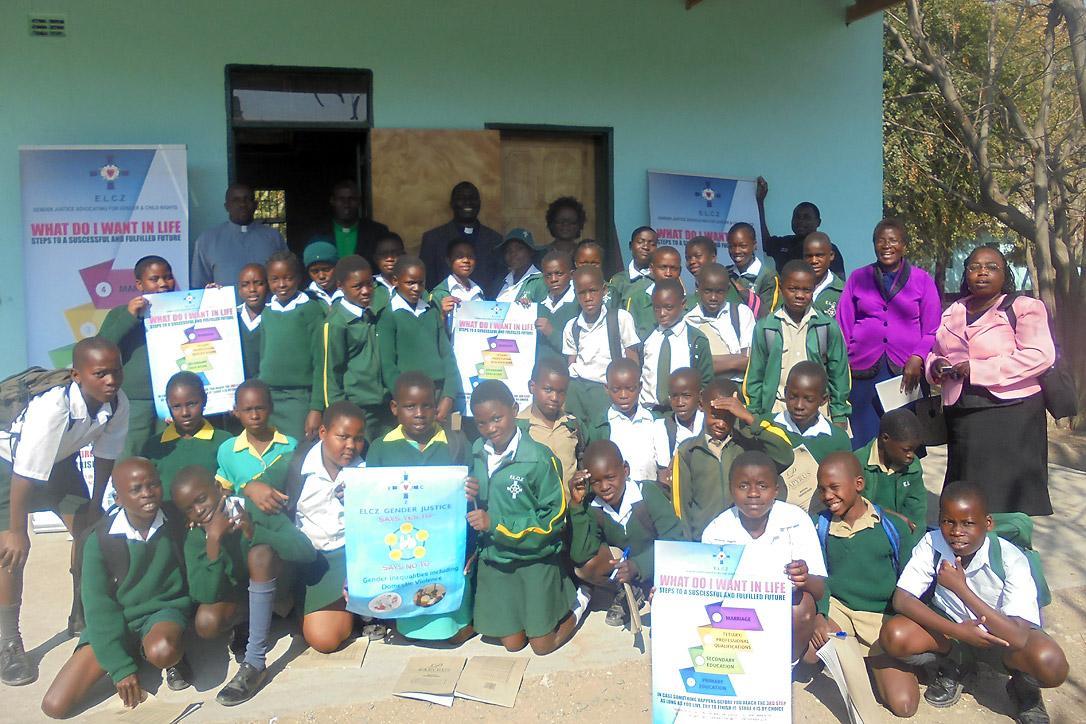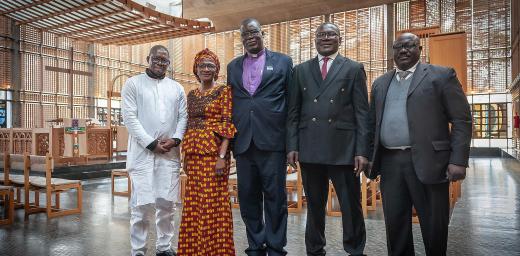Zimbabwe’s Lutheran church tackles child marriage and domestic violence

Students of ELCZ schools learn the equality of men and women. Photo: LWF
Government to adapt Lutheran gender policy to fit school curriculum - 16 Days of Activism
(LWI) – Child marriage remains a critical social problem in Zimbabwe but a new Lutheran program aims to address the issue.
“Polygamy is still common, whereby girls as young as 13 years, mainly from poor rural families, are forced to marry much older men as a third or fifth wife, hence destroying all education opportunities and the future life of these girls,” explains Rev. Elitha Moyo, the gender justice program coordinator of the Evangelical Lutheran Church in Zimbabwe. Violence is common in such households.
“Regardless of the girl’s desire for education in such cases, she is usually married off to curb poverty in the family. When poor families are confronted with the impossibility of offering school education to all their children, girls are normally the ones removed from school even when they may be more focused or school oriented compared to their brothers.
“Sometimes the family receives bags of maize and cattle as dowry in return for their daughter. Our goal is to change behavior by raising awareness about the health, psychological and physical risks and harm of this practice on girls,” Moyo says.
Gender justice training in Lutheran schools
“Girls and boys are now slowly starting to take part equally in house chores, although it does not yet happen in every family, says Whitney Gengere, a 16-year-old at the Mnene Mission Secondary School, south Zimbabwe.
While girls still cook and boys fetch firewood, in all, a lot has changed over the past few years.
Gengere’s classmate, Brandon Msakanda, agrees students are more aware of the need to treat girls and boys equally. But, he adds, the practice of child marriage still exists. Although it is declining due to tighter controls by government, it affects girls the most.
Gengere and Msakanda attend one of 15 ELCZ schools, all of which have had training on gender justice since 2015. The training is part of the gender justice policy, a pioneer program of the Lutheran church, implemented in June last year.
The aim is to instill the notion that men and women in Zimbabwean society are created equal as human beings and both genders should be accorded equal opportunities. The program seeks to empower women who traditionally suffer discrimination and exclusion due to traditional stereotypes that favor boys over girls.
Largely seen as successful, the policy has received support from the government, with the Ministry of Education and Gender preparing to introduce gender justice into a new curriculum for primary and secondary schools throughout the country.
“We are very excited to see that the principles of gender sensitivity – inclusivity, equality and fairness – will be part of the school curriculum, thanks to the efforts of the Lutheran church,” says Moyo who leads the project.
The ELCZ holds gender justice training sessions in several of its congregations in remote villages. Moyo says it has increased the understanding of gender roles. Issues are now openly discussed, including the need to end many harmful practices in society that affect the welfare of women.
“For example, when a woman dies, her younger sister is forced to marry her surviving husband. This should not happen, especially to girls who are but children themselves,” she adds.
Perceptions are changing
Rodwell Ncube, who took part in a training program, says perceptions are changing in a society in which men are socialized to see themselves as superior to women. He says the ELCZ training has generated discussion about gender injustice at village meetings.
“For instance when a man dies the inheritance goes to his younger brother. It is often difficult to break the cycle of early child marriages because of the persistent poverty. Children have access to primary school but not to secondary school, which causes problems as many of those from poor families drop out after primary school. Parents are aware of that and sometimes feel that the girls are better off married than becoming drop outs with no possibilities for further studies,” Ncube explained.
Another participant, Hloniphani Dube, said the project has helped create new role models, especially for boys and girls in villages. It has fostered discussions in families about gender roles. “The workshop also made men realize their role in the families. Before the training it was only women fetching water but now men also do it. Gender justice is important because it brings peace in homes,” she added.
Moyo says the ELCZ gender justice program was inspired by The Lutheran World Federation gender justice policy process. “In our case, we opted first for a local policy to which we can adapt several of the issues outlined in the global LWF policy.” Other churches in the country are interested in the policy, which is shared with the government through its ministry of women's affairs, gender and community development, and the Zimbabwe Council of Churches.
“Both policies serve the same purpose of making our churches and communities more aware of the need for gender justice in all regions of the Lutheran communion.” Both are being translated into the two main local languages.





